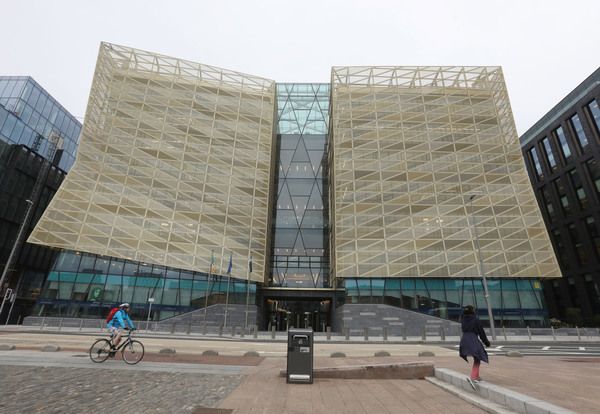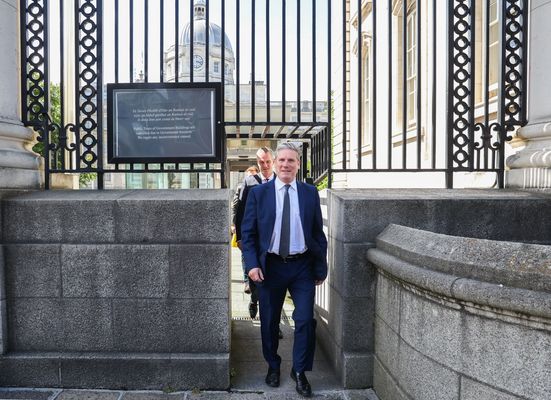While heads were turned for the Budget at Westminster last week, the swagger of British sovereignty struck another blow against the implementation of the Ireland/Northern Ireland Protocol. This was less about the substance of the delayed implementation of the Irish Sea border and more about attitude. Nor does it matter whether Gove or Frost is in the driving seat: the point is the UK Government took unilateral action outside the procedures painstakingly agreed in the Protocol.
This is hopeless for the trust that any international agreement requires for successful implementation. But the real danger is that the latest UK move heralds a strategy of wrecking the Protocol. If the EU is unable to secure UK cooperation in defending the integrity of the single market at the Irish Sea border, then there is the possibility of drawing a new border between Ireland and mainland Europe.
This is the glint in the eye of the Brexit Ultras: the prospect of peeling Ireland away from the EU and back into Britain’s orbit. The whiff of Empire 2.0 is back in the air.
I spoke to @MarosSefcovic this evening about the limited and temporary operational measures we have announced today for Northern Ireland. https://t.co/08FZVN2KAW
— David Frost (@DavidGHFrost) March 3, 2021
There is more than a whiff of colonialism in the Budget process itself, and the way public expenditure is allocated to the devolved jurisdictions, especially in the case of the North of Ireland.
The die was cast at partition which swept away the democratic mandate of the 1918 election and sought to establish parliaments for Southern Ireland and Northern Ireland. Many assumed that the Boundary Commission would shrink the six counties and that Northern Ireland would quickly become unviable because of the requirement to pay an ‘imperial contribution’ towards the cost of British military forces and national debt.
BEGGING BOWL TO LONDON
But the six counties remained the Six Counties and a Northern Ireland government, on the point of bankruptcy due to the costs of policing and unemployment for much of the 1920s and 1930s, was regularly bailed out by the Treasury. Instead of the class politics of a nation state around revenue raising and redistribution, the North had the unionist politics of putting out the begging bowl to London and, until the collapse of the Stormont regime in 1972, the politics of discriminatory spending.
One way of describing Barnett consequentials is to see them as a benefit of the union for which the people of Northern Ireland, Scotland and Wales should be grateful. Another is to see them as a form of colonialism that holds the North in the grip of the Treasury and the shadow of English politics.
Following the welfare state settlement in the late 1940s, post-partition subsidies were put on a more permanent basis. It was agreed that Britain would continue to subsidise the Northern state as long as national insurance contributions and taxes remained the same as in GB. This ‘parity principle’ of a single system of “social security, child support and pensions for the United Kingdom” is re-stated in the 1998 Northern Ireland Act. On one occasion in the 1950s, the Unionist government toyed with the idea of breaching parity. It wanted to restrict Family Allowances (the forerunner of Child Benefit) but was successfully warned off by the Treasury.
What determines the amount of public expenditure in the North over and above the parity convention? Begging bowl politics is part of it, such as when Theresa May’s government needed the DUP for a majority and was prepared to pay for the votes through a confidence and supply agreement. Deception is a rarer part, as in the Renewable Heat Incentive scheme which was designed to lever resources from the Treasury outside of the block grant. These examples, however, are a small part of the story and the Treasury has always been keen to avoid such politicking.
In place of annual bargaining, the Treasury adopted a fairly simple procedure in the late 1970s that became known as the Barnett Formula (after Joel Barnett who was Chief Secretary to the Treasury at the time). When you hear talk of ‘Barnett consequentials’, this refers to extra funding that will come to the North as a consequence of decisions that have been made about England, for England.
The formula has been in play for over forty years. Starting from the historic pattern of expenditure up to 1978, any increases are determined by public expenditure decisions that Downing Street makes in relation to central and local government priorities for England. The Northern Ireland Executive receives a share of these changes based on population size and the extent to which spending is comparable. Clearly, this is not a needs-based approach focused on the circumstances in the North, nor one that recognises the distinctive history of partition and conflict.
STEP OUT OF LINE AND SEE WHAT HAPPENS
One way of describing Barnett consequentials is to see them as a benefit of the union for which the people of Northern Ireland, Scotland and Wales should be grateful. Another is to see them as a form of colonialism that holds the North in the grip of the Treasury and the shadow of English politics. Social security policy is formally devolved, but step out of line and see what happens. Witness the Treasury’s imposition of ‘fines’ for Stormont’s ‘non-compliance’ over the delayed implementation of Universal Credit between 2012 and 2016.
Rules are also made to be broken. The blank cheque given to prisons, policing, the military and intelligence agencies during the conflict had nothing to do with Barnett. And contrast this magic money tree with the insistence that pensions for victims and survivors must be paid for out of the block grant.
Can the North break away from the clutches of Her Majesty’s Treasury? Some voices, both North and South, say not: the mismatch between expenditure and the taxes raised – the subvention – is too great for the Republic to absorb without a sharp decline in living standards, especially following the debt accumulated in coping with Covid and the economic hit of Brexit. Game, set and match to the union – or is it?
We should not be intimidated by the scale of the subvention for three reasons.
First, in any unity scenario, Britain would continue to pay the state pensions of those already retired, just as it now supports British pensioners who have moved to Malaga or Cork. It is rarely appreciated that two out of every five pounds (39 per cent to be exact) of public expenditure in the North goes on social security benefits and that the biggest block of social security spending – 42 per cent – is on the state pension. The figures are similar in the Republic: 41 per cent of total public spending is on social security and pensions make up 38 per cent of that.
Secondly, the subvention varies over time according to decisions on taxation and spending made by the British Treasury. Rishi 'I’m-a-Conservative-and-believe-in-low-taxes' Sunak is a member of a party that has consistently shifted taxation away from business, income and wealth, and on to ‘sin taxes’ (alcohol, cigarettes, gambling) and shopping (VAT): from ‘progressive’ to ‘regressive’ taxation, with the effect of increasing the subvention – and inequality.
The third point about the subvention is this. What would the gap between revenue and expenditure look like if the North’s population was mapped on to the PAYE system in the Republic? The North would certainly contribute more to Cáin agus Custaim na Éireann than it currently does to Her Majesty’s Revenue and Customs because higher earners would pay more than they do now.
The Republic’s personal taxation system (including social insurance) is more progressive than the UK’s. Northern full-time workers in the lower half of the earnings distribution would have marginally more take-home pay under the Republic’s PAYE regime, whereas those at the higher levels would lose out, but not by much. Even so, for most levels of earnings and different household types, both the UK and the Republic apply below average taxes by EU standards. And yet the Republic still manages to pay Child Benefit at a rate which, in real terms, is worth 50 per cent more for two children than in the UK; and the state pension is considerably more generous.
It is time to stop thinking of the North as a burdensome basket case and instead to imagine what the North brings to the piece.








